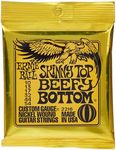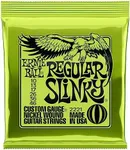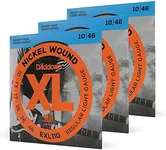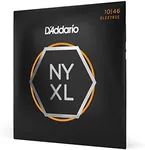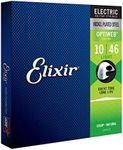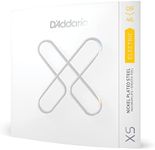Buying Guide for the Best Electric Guitar Strings
Choosing the right electric guitar strings can make a big difference in how your guitar feels and sounds. The strings you pick affect the tone, playability, and even how long you can play comfortably. It's important to consider your playing style, the type of music you enjoy, and your experience level when selecting strings. Understanding the key specifications will help you find a set that matches your needs and helps you get the most out of your instrument.GaugeGauge refers to the thickness of the strings, usually measured in thousandths of an inch. Lighter gauge strings (like .008 to .009) are easier to press and bend, making them great for beginners or players who like to play fast and do lots of bends. Medium gauges (like .010 to .011) offer a balance between playability and tone, suitable for most styles. Heavier gauges (.012 and above) provide a fuller sound and are better for rhythm or genres like jazz and metal, but they require more finger strength. To pick the right gauge, think about your comfort level, the style of music you play, and whether you prioritize ease of play or a thicker tone.
MaterialThe material of the strings affects both the feel and the sound. Nickel-plated steel is the most common and offers a bright, balanced tone suitable for most genres. Pure nickel strings have a warmer, vintage sound, while stainless steel strings are brighter and more resistant to corrosion. There are also coated strings, which last longer but may feel slightly different under your fingers. Choose the material based on the sound you prefer and whether you want longer-lasting strings or a particular feel.
Winding TypeWinding type refers to how the thicker strings are made. Roundwound strings are the most common and have a textured feel with a bright, lively sound. Flatwound strings are smoother and produce a mellower, darker tone, often favored by jazz and blues players. Halfwound (or groundwound) strings are a compromise, offering some of the smoothness of flatwounds with a bit of the brightness of roundwounds. Your choice should depend on the style of music you play and whether you prefer a smooth or textured feel.
String CoatingSome strings have a special coating to protect them from sweat and dirt, which can extend their lifespan. Coated strings tend to last longer and stay brighter, but some players feel they have a slightly different texture or sound compared to uncoated strings. If you play often or have acidic sweat that wears out strings quickly, coated strings might be a good choice. If you prefer a more traditional feel and sound, uncoated strings may suit you better.
Core TypeThe core is the wire at the center of the string, and it can be either round or hexagonal in shape. Hex core strings are more common and provide a brighter, more consistent sound with better tuning stability. Round core strings have a slightly warmer tone and a more flexible feel, which some players prefer for vintage styles. Consider core type if you are looking for a specific feel or sound, but for most players, either type will work well.
